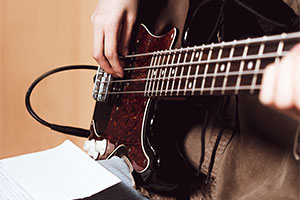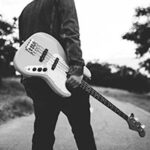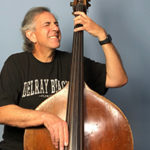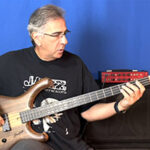Learn to take off those sight-reading training wheels
By Jon Liebman
June 3, 2022
First, let me get something out of the way.
Over the past 30+ years, I’ve developed a tremendous volume of resources for learning bass. When you add up all the lessons in my books, all the stuff inside For Bass Players Only – including my online membership, the Bottom Line Club, and my digital course, Power Grooving for Bass Players – plus all my YouTube tutorials, and everything else – that’s a lot of notes!
And you know what every one of those notes has???
Tablature.
Did I hit a nerve with that word? Actually… I hope I did.
Answer these questions truthfully:
· How much do you rely on tablature when you’re learning bass?
· How well can you read music?
· How badly do you want to read music?
I’m not saying tablature is a bad thing. But it can really hold you back if you let it.
On the one hand, you can think of tab as training wheels for learning to read music. The end goal, though, should be to have the ability to read a piece of music competently and confidently, without the tab.
A tab/no-tab story
The subject came up during my conversation with John Barker for this week’s FBPO interview. “Who’s John Barker?” you ask? John is a student at For Bass Players Only. He’s both an active member of the Bottom Line Club and a diligent student of Power Grooving.
John has come such a long way with his bass playing and overall musicianship since he started learning bass at FBPO. When we spoke, he couldn’t stop talking about how much his bass technique is continuously improving, and how much he loves the results-oriented framework I’ve developed in my Growth Track and my Groove Grower™ systems.
Interestingly, when the subject of reading came up, John pretty much shrugged of the whole tab issue.
“I’m not a tab person,” he says. “I grew up playing saxophone. I didn’t get into bass until later, so I already knew how to read.”
Granted, John had a head start reading music. But reading saxophone charts is not any kind of preparation for knowing where to put your fingers on the bass fingerboard.
I’m not saying tab is a bad thing. But…
When he first started learning bass, John did find himself sticking his toe into the tab world, mostly out of necessity.
“It wasn’t until I started with my rock bands that I discovered tab,” he says. “It wasn’t too hard, but I would do that just when I had to quickly learn a tune.”
I can’t tell you how refreshing it was to hear John’s thoughts on tab as a learning tool. While a lot of people are forever lost without tab, John approached it just as a way to get started when he needed to learn something in a hurry. And that’s actually a healthy way to use tab.
In the big picture, you’ll be much better off trying to read music without the tab, at first. You can consult it afterwards, either to double check the fingering you came up with, or to get answers to things you couldn’t figure out on your own. Imagine how much faster you’ll learn to actually read by doing it that way, and how much stronger your reading will overall.
The reason I’ve included tab in all my bass-learning resources is because when I first started developing stuff for learning bass, I understood it to be a given, a necessity for anyone who wanted to learn bass. While I don’t regret it, I don’t want to see it become a crutch either.
My tab-free alternative
Recently, I’ve started adding tab-free options to my lessons and courses inside For Bass Players Only, mostly at the request of a growing number of students who’ve told me they don’t like it (to be clear, I still include tab with everything I publish; the tab-free versions are an additional option, to provide the best of both worlds for my students).
John said something else I hadn’t really thought of: “I think it takes a lot of room,” which made me laugh.
It’s what he said after that that was music to my ears: “I just read the music. I don’t even bother with tab when I’m playing.”
Good for you, John. I bet if feels great to be playing bass and reading music without the need for training wheels.
What about you? Have a thought on the subject? Leave a comment below and let me know what you think about tablature as an aid in reading music. In the meantime, watch my interview with John here.






In the early 1970s when I was first learning Bass. Tablature was not available to me. To my recollection.
While in high school jazz band. We were given sheet music for the song. Honky Cat, in the mood, black Orpheus…
No tabs. Later in college music school, I learned classical on the upright bass. There’s no tab in classical music!
So, I learned early on to read music.
Now as an adult as I picked up the electric bass again at age 50-60 there’s all this tablature to go along with reading music. A crutch.
I bugged Jon for years about tab free sheet music. So when he finally provided tab-free sheet music I was relieved!
Yes, Joe, you definitely played a role in my adding a tab-free option to my lessons. Thanks! 🙂
As with your student, John Barker, I was already playing trumpet at age 13 or so when I began on the electric bass. There was no TAB, so the instructional books were written as conventional music. TAB shows where to put the fingers for those notes that can be played on different strings. When I am writing out a part for myself, I will use a form of TAB which is a combination of TAB and notes. Using a 4-line staff for a 4-string bass, I will indicate fret number on the string and then add the tail to indicate the time value (Quarter note, eighth note) as the case may be. This way I can work out the most efficient way to play a line.
Knowledge is powerful, so knowing both TAB and written music is very helpful, giving you fewer limitations.
That approach can work. Tab is not inherently a bad thing. In fact, it can be helpful if used appropriately. Thanks for weighing in, Craig!